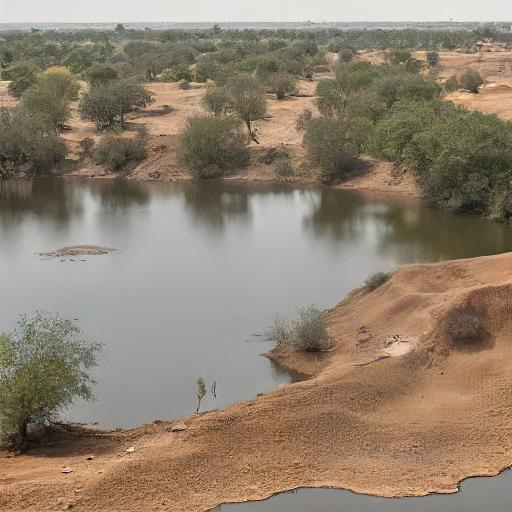Situated in Central Africa, Lake Chad was once a flourishing freshwater reservoir that sustained the lives of more than 30 million people across Chad, Cameroon, Niger and Nigeria. However, the lake has drastically shrunk by around 90% since 1963. This diminishing body of water crucial for irrigation, fishing and drinking is now at the heart of a crisis affecting humans and the environment.
The emergence of Boko Haram in a declining region
The reduction in Lake Chad’s size has resulted in food shortages and population displacement. As the lake diminishes, intensifying competition for resources like water and land exacerbates issues related to hunger, malnutrition, and poverty. This decline in living standards compels many to abandon their homes leading to increased displacement and conflicts over what resources remain available.
It is in this setting that Boko Haram, a jihadist group created in 2002 that pledged allegiance to the Islamic State in 2015, has found fertile ground for its activities. Originally founded in the northeastern state of Borno, Nigeria to uproot the injustice blamed on Western influence, Boko Haram is now also active in Cameroon, Chad, and Niger in the Lake Chad region, in response to the military operations by the Multinational Joint Task Force (MNJTF). The inability of national governments to tackle socioeconomic issues has paved the way for Boko Haram’s emergence, as inadequate measures have harmed livelihoods, making people more vulnerable to jihadist recruitment.
The connection between climate change and jihadist recruitment
The environmental challenges in the Lake Chad Basin are fueled by climate change leading to unpredictable weather patterns that worsen competition for resources like water and fertile land. These challenges are exacerbated by population growth, urbanization, uneven economic progress, and ineffective climate policies. As poverty levels grow because of shifting weather patterns, deteriorating livelihoods trigger displacement and spark conflicts over natural resources. This has resulted in heightened competition for resources among communities leading to tensions that Boko Haram exploits for recruitment purposes and territorial dominance.
The connection between climate change and jihadist recruitment is evident in how Boko Haram takes advantage of the worsening local living conditions. As temperatures climb and rainfall patterns become more erratic, the productivity of the land diminishes. This disruption hinders farming and herding practices leaving many without stable income sources. Thus, the rise in poverty and social displacement creates economic pressures that Boko Haram exploits by providing incentives and a sense of security to those who have lost faith in governments and international aid organizations.
Local climate impacts and social disruption
The socioeconomic challenges confronting the Lake Chad Basin communities are not solely due to climate factors. Persistent issues, like corruption, weak governance, and inadequate infrastructure also significantly contribute to instability. To maintain control over the area, Boko Haram catalyzes distrust in local institutions by providing socio-economic support to the population.
The region’s youth lack opportunities for education and employment, making them susceptible to recruitment by jihadist groups. Boko Haram offers them a sense of purpose and community along with promises of economic gain. Boko Haram is reported to regularly pay its fighters and provide economic support for the widows and children of its fighters thanks to the substantial funds from kidnap-for-ransom operations and bank robberies. Thus, for many, joining this group seems like the way out of poverty and a means to support their families.
Strategies for addressing radicalization
To counter violent jihadist recruitment in the Lake Chad Basin it is crucial to tackle the root causes of radicalization. This entails enhancing good governance practices, improving access to state services, and addressing issues related to social exclusion and state oppression. By empowering society and implementing inclusive mechanisms for managing natural resources, social unity can be restored while diminishing the attractiveness of jihadist organizations. Collaborative management by communities of shared spaces around the lake to promote climate-proof livelihoods can help alleviate economic insecurity.
Efforts like supporting farming initiatives with financial aid can assist communities in managing financial challenges and decreasing the likelihood of conflicts. Additionally, investing in education and job training is crucial to equip individuals with the skills they need for employment, thus reducing the potential recruitment base for jihadist groups in the area. Encouraging entrepreneurship and aiding small businesses can also play a role in building economic resilience.
The issues affecting the Lake Chad Basin extend beyond national borders. Collaborative action among Chad, Cameroon, Niger, and Nigeria is vital to tackle the interconnected problems of growing economic hardship and jihadist recruitment. International backing is equally important. The global community must acknowledge the gravity of the crisis in the Lake Chad Basin and offer financial and technical support. These funds should be used to assist in implementing climate adaptation programs and backing economic development projects, as part of a comprehensive approach to decreasing the global threat of international terrorism and achieving the Sustainable Development Goals (SDGs) for all.


